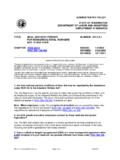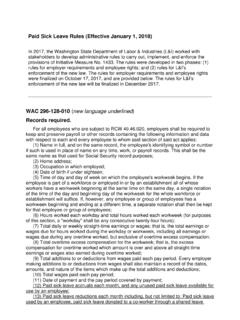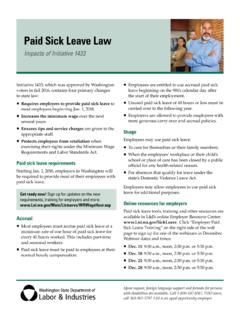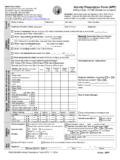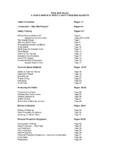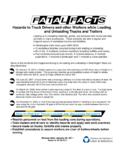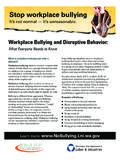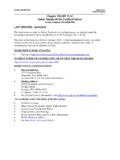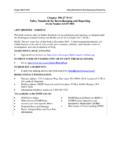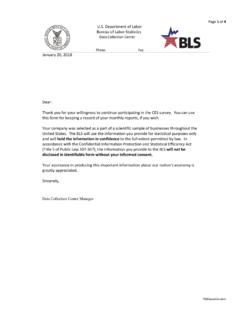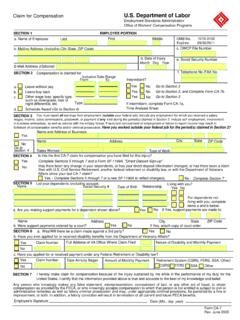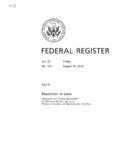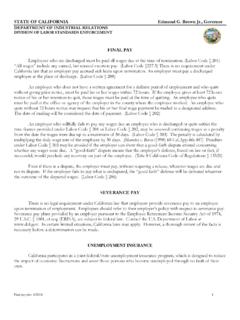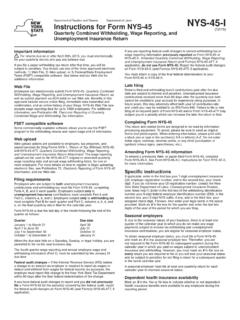Transcription of ADMINISTRATIVE POLICY STATE OF WASHINGTON …
1 ADMINISTRATIVE POLICY STATE OF WASHINGTON department OF labor AND INDUSTRIES EMPLOYMENT STANDARDS TITLE: HOURS WORKED NUMBER: CHAPTER: RCW REPLACES: ES-016 WAC 296-126 ISSUED: 1/2/2002 REVISED: 6/24/2005 REVISED: 11/28/2007 REVISED: 9/2/2008 ADMINISTRATIVE POLICY DISCLAIMER This POLICY is designed to provide general information in regard to the current opinions of the department of labor & Industries on the subject matter covered. This POLICY is intended as a guide in the interpretation and application of the relevant statutes, regulations, and policies, and may not be applicable to all situations.
2 This POLICY does not replace applicable RCW or WAC standards. If additional clarification is required, the Program Manager for Employment Standards should be consulted. This document is effective as of the date of print and supersedes all previous interpretations and guidelines. Changes may occur after the date of print due to subsequent legislation, ADMINISTRATIVE rule, or judicial proceedings. The user is encouraged to notify the Program Manager to provide or receive updated information. This document will remain in effect until rescinded, modified, or withdrawn by the Director or his or her designee. 1. The department has the authority to investigate and regulate hours worked under the Industrial Welfare Act. Hours worked, means all hours during which the employee is authorized or required, known or reasonably believed by the employer to be on duty on the employer's premises or at a prescribed work place.
3 An analysis of hours worked must be determined on a case-by-case basis, depending on the facts. See WAC 296-126-002(8). See ADMINISTRATIVE POLICY The department s interpretation of hours worked means all work requested, suffered, permitted or allowed and includes travel time, training and meeting time, wait time, on-call time, preparatory and concluding time, and may include meal periods. Hours worked includes all time worked regardless of whether it is a full hour or less. Hours worked includes, for example, a situation where an employee may voluntarily continue to work at the end of the shift. The employee may desire to finish an assigned task or may wish to correct errors, prepare time reports or other records. The reason or pay basis is immaterial.
4 If the employer knows or has reason to believe that the employee is continuing to work, such time is working time. An employer may not avoid or negate payment of regular or overtime wages by issuing a rule or POLICY that such time will not be paid or must be approved in advance. If the work is performed, it must be paid. It is the employer s responsibility to ensure that employees do not perform work that the employer does not want performed. The following definitions and interpretations of hours worked apply to all employers bound by the Industrial Welfare Act, even those not subject to the Minimum Wage Act. There is no similar Hours Worked Page 1 of 8 Section 2 Revised 11/28/2007 Section 2 Revised 9/2/2008 definition of hours worked in RCW , the Minimum Wage Act, or in WAC 296-128, Minimum Wage rules.
5 Therefore, these definitions and interpretations apply to all employers subject to RCW , regardless of whether they may be exempt from or excluded from the Minimum Wage Act. 2. What is travel time and when it is considered hours worked? Introductory statement to the POLICY : This POLICY is designed to provide general information in regard to the current opinions of the department of labor & Industries on the subject matter covered. This POLICY is intended as a guide in the interpretation and application of the relevant statutes, regulations, and policies, and may not be applicable to all situations. This POLICY does not replace applicable RCW or WAC standards. If additional clarification is required, the Program Manager for Employment Standards should be consulted.
6 This document is effective as of the date of print and supersedes all previous interpretations and guidelines. Changes may occur after the date of print due to subsequent legislation, ADMINISTRATIVE rule, judicial proceedings, or need for clarification. The user is encouraged to notify the Program Manager to provide or receive updated information. This document will remain in effect until rescinded, modified, or withdrawn by the Director or his or her designee. The purpose of this POLICY statement is to update section two of labor and Industries ADMINISTRATIVE POLICY (section 2) pertaining to hours worked. Following the Stevens v. Brink s Home Security decision, labor and Industries committed to updating this section of the POLICY to reflect the Supreme Court decision in the Brink s case and address ambiguity created by that case.
7 [Stevens v. Brink s Home Security, 162 42, 169 473 (2007)]. This POLICY is not intended to address or cover all employee travel time issues. Instead, it is limited to the particular issues raised in the Brink s case regarding whether time spent driving a company-provided vehicle between home and the first or last job site of the day constitutes compensable hours worked. Whether time spent driving in a company-provided vehicle constitutes paid work time depends on whether the drive time is considered hours worked. Whether travel or commute time is compensable depends on the specific facts and circumstances of each individual employee, employer, and work week. If the travel or commute time is considered hours worked under RCW and WAC 296-126-002(8), then it is compensable and the employee must be paid for this time.
8 These statutory and regulatory requirements cannot be waived through a collective bargaining agreement or other agreement. Hours worked means all hours when an employee is authorized or required by the employer to be on duty on the employer s premises or at a prescribed workplace. WAC 296-126-002(8). There are three elements to the definition of hours worked: 1- An employee is authorized or required by the employer, 2- to be on duty, 3- On the employer s premises or at a prescribed workplace. If any of the three elements is not satisfied, then the time spent driving in a company-provided vehicle is not considered hours worked. The specific factors used to establish the authorized Hours Worked Page 2 of 8 Section 2 Revised 11/28/2007 Section 2 Revised 9/2/2008 or required element are not listed in this POLICY .
9 However, the element must be met for hours worked under the law. Time spent driving a company-provided vehicle during an employee s ordinary travel, when the employee is not on duty and performs no work while driving between home and the first or last job site of the day, is not considered hours worked. Time spent driving a company-provided vehicle from the employer's place of business to the job site is considered hours worked. Time spent riding in a company-provided vehicle from the employer's place of business to the job site is not considered hours worked when an employee voluntarily reports to the employer s location merely to obtain a ride as a passenger for the employee s convenience, is not on duty, and performs no work. Time spent driving or riding as a passenger from job site to job site is considered hours worked.
10 Factors to consider in determining IF AN EMPLOYEE IS on duty when driving a company-provided vehicle between home and work. To determine if the employee is on duty, you must evaluate the extent to which the employer restricts the employee s personal activities and controls the employee s time. This includes an analysis of the frequency and extent of such restrictions and control. Following is a non-exclusive list of factors to consider when making a determination if an employee is on duty. There may be additional relevant factors that the Supreme Court or L&I have not considered. All factors must be considered and weighed in combination with each other. The mere presence or absence of any single factor is not determinative.
